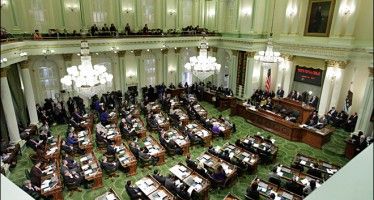‘Funding scheme’ or help for small business?
April 11, 2012
By Katy Grimes
Does California need another small business loan guarantee program specifically for clean energy companies and agricultural businesses? California State Controller John Chiang and San Francisco Sen. Leland Yee think so. But some are questioning the motive behind the bill, saying it is merely a vessel for landing federal funding.
Chiang and Yee, both Democrats, have authored legislation creating the California Agricultural and Renewable Energy Export Loan Guarantee Financing Program, with plans to operate out of the Treasurer’s office under the existing California Pollution Control Financing Authority.
The purvue of the pollution control financing program has been greatly expanded over the years to include all types of small business, with multiple pieces of legislation every year broadening the scope of the program. In a fox-guarding-the-henhouse manner, most of the legislation appears to have been sponsored by the treasurer’s office.
With Controller John Chiang making no secret of his desire to run for state treasurer, SB 1465 sponsored by Chiang’s office makes sense.
But many are worried that the new loan guarantee program will cannibalize the existing and successful Small Business Loan Guarantee Program. More likely, however, this is just a shell program in which to grab available federal money, which always comes with a use-it-or-lose-it string attached.
The larger concern is the continuing expansion of the California Pollution Control Financing Authority.
Loan Programs
Recently, the California Capital Access Program and the Small Business Loan Guarantee Program made a joint proposal to the Obama administration for small business loan funds. They came home with approval for $84 million. The first payment was scheduled to be received in January.
But this wouldn’t have been possible without commensurate legislation.
The state treasurer’s office oversees CalCAP, which “encourages banks and other financial institutions to make loans to small businesses that fall just outside of their conventional underwriting standards.”
On February 16, the treasurer’s office passed emergency regulations to the CalCAP program, allowing “microbusiness lenders” to be included in the program. This is significant because as the definition of responsibilities for this obscure loan program has expanded, and the treasurer’s office now controls vast amounts of money available to small businesses identified as credit risks.
SB 1116, introduced Feb 17 by Sen. Mark Leno, D-San Francisco, and sponsored by the treasurer’s office, addressed this change. According to the bill, the change is “to increase borrower participation in CalCAP, and enable the Treasurer’s office to expend the full amount of its $84 million allotment of federal funds for CalCAP from the federal State Small Business Credit Initiative Act of 2010. Any portion of those federal funds which California fails to spend by the end of 2016 will revert to the federal government.”
On February 24, Yee and Chiang introduced SB 1465.
Last year Assemblyman Bob Blumenfield authored AB 796, which would create the Capital Access Loan Program for small businesses, also administered by the California Pollution Control Financing Authority, to provide loans through participating financial institutions to small businesses. AB 796 has been amended five times and is in the Senate Senate Committee Governance and Finance committee.
At a hearing Monday in the Senate Government Organizational Committee, Yee said that the purpose for his proposed legislation is to promote export development for clean energy and agricultural businesses in California. But opponents say it would just create a competing state program.
Yee’s explanation sounds noble, but there is a dubious lack of detail in the bill.
“There’s nothing magical about export financing,” said Rina Venturini, who represents Financial Development Corporations, which provide loans to small California businesses, and do it very efficiently. Venturini testified in opposition SB 1465.
Committee Chairman Sen. Rod Wright, D-Inglewood, asked Yee and a representative from the controller’s office why the bill was needed, and why small businesses needing loans couldn’t just continue to use the existing programs. “This provides another avenue to small business,” Yee said.
And that is about as much information about SB 1465 as Yee or the controller’s office could provide.
In apparent haste to meet the 2012 legislative deadline for new bills, SB 1465 started out with language specific to providing loan guarantees to the solar industry. Then the bill was amended to include agriculture and renewable energy. The controller’s office said that, as SB 1465 makes its way through the committee process, it will probably be refined, the language tightened up and maybe even more dramatically amended.
But with the current success of the existing programs, as well as all of the behind-the-scenes moves to land the federal funds, something doesn’t add up.
Financial Development Corporations
FDC’s have a default rate of only .05 percent, Venturini told me, proving just how efficient they are. The Small Business Administration default rate is between 7 and 9 percent, which is still low, but not nearly as clean as Financial Development Corporations.
Venturini explained that, with FDC loans, money does not actually change hands between the banks and small business borrowers. Only if a borrower defaults does funding kick in. And the very small, low overhead Financial Development Corporations provide work-through assistance to the risky borrowers in order to prevent defaults and help rebuild credit for small business owners.
The loans are geared toward risky borrowers to begin with, which is why they need guarantees and why FDCs help with loan work-outs.
CalCAP is not suited to spend time on loan work-outs the way FDCs are. CalCAP is located in the Treasurer’s office in Sacramento. FDCs are located throughout the state closer to borrowers.
Are you a good bill or a bad bill?
“In order to stimulate our state’s economy and create jobs here in California, we must assist our small businesses who want to expand globally,” said Yee. “SB 1465 will provide new opportunities for our agricultural and clean energy sectors, while ensuring that taxpayer dollars are used appropriately and effectively.”
Then is this just a redundant program?
The controller’s office describes the proposed loan guarantee program as “complementary” to existing programs. “It is additional assistance to small business outside of the Small Business Loan program,” said Jacob Roper, a spokesperson with the controller’s office. “Small business is facing funding problems.”
Roper explained that the idea came from the California Export Development Office, another loan program run by the state from 1985 to 2003. The export development office made money for the state while it assisted California companies with loan guarantees. Initially funded with $2 million from the general fund, the program consistently performed well, and was a success.
But it was shut down in 2003 when the California Technology, Trade and Commerce Agency was eliminated. Since then, the Small Business Administration and the Financial Development Corporations have filled in the gap nicely and effectively, according to Venturini.
There are 11 Financial Development Corporations already operating in California, managed by the Business, Transportation and Housing Agency; two are specific to agriculture financing, and one is just for energy financing. Venturini testified that there is nothing preventing any business from acquiring export financing, and questioned the need and motive for creating a redundant loan guarantee program.
“This is duplicative and will be in competition with the Small Business Loan Guarantee Program,” Venturini told legislators.
But Yee said that small business is always in need of help. “Why are we closing the door on those individuals?” Yee asked the committee.
“Your program will cannibalize existing fund programs,” Wright told Yee. “We shouldn’t damage existing programs.”
But there was no mention at the hearing about acquiring federal funding.
Instead, Yee said, “This bill is a shell. We don’t have funding. We ought to give it a chance to come back with a new funding scheme.”
Related Articles
Sacramento mired in budget bickering
Having failed to deliver during a special legislative session Gov. Jerry Brown called last year, Sacramento Democrats and Republicans squared off
Brown Debt Gimmicks 'Balance' Budget
JUNE 14, 2011 By WAYNE LUSVARDI Most knowledgeable people realize that California’s debt emperor has no clothes. Even if the
Bloviating rather than budgeting
SEPT. 1, 2010 By KATY GRIMES Speeches, speeches and more speeches, took precedence over cries for “jobs, jobs, jobs,” at





